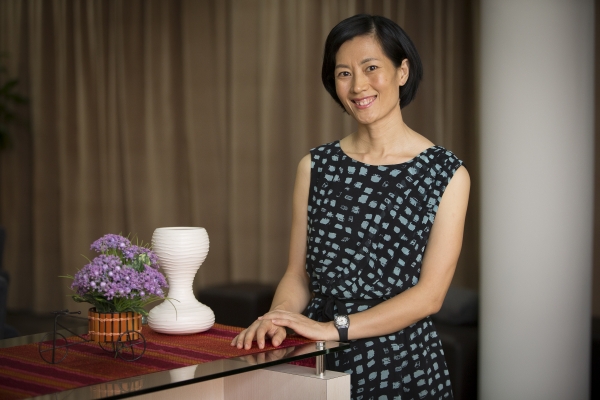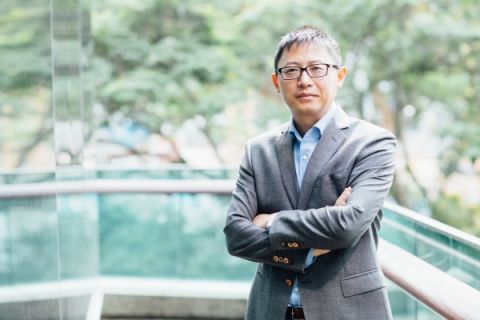
By Alvin Lee
SMU Office of Research & Tech Transfer – In a 2018 ISI Foundation article published in Nature Physics, the Torino-based research foundation found a significant amount of interdisciplinary work in Nobel-winning research that gets awarded the prestigious prize in any given single field. The article called for the Nobel Prize to recognise the importance and impact of interdisciplinary research, and update the categories accordingly to reflect current reality.
In a similar vein, Singapore Management University’s (SMU) newly-established College of Graduate Research Studies (CGRS) was set up “to develop world-class thought leaders who are trained to undertake cutting-edge research across disciplines, bringing about significant impact to businesses, societies and public institutions worldwide”.
But what was the impetus that led to the establishment of SMU’s eighth school?
“We looked at all the courses offered by the different schools at SMU, and we thought, ‘What's the synergy? What's lacking?” explains Wang Heli, Dean of CGRS. “Sometimes there's a course that a student wants to take but is not available at his school, or a course may be available but doesn’t fit what is required.
“For example, there are machine learning methodology courses which are part of modern research tools. Previously, machine learning courses were offered only within the context of computer science in SCIS (School of Computing and Information Systems). Students from other schools such as the business school or school of social science would get lost, and would not know how to apply it in their research. To address this concern, we found faculty from the School of Accountancy whose own research was also interdisciplinary, and was able to offer a practical machine learning course for PhD students from outside of SCIS.”
Allowing for depth and breadth
Machine learning courses make up part of CGRS’s Graduate Research Interdisciplinary Topics (GRIT) programme, one of the School’s two key elements which also includes “Applied Econometrics in Social Science” and “Introduction to Interdisciplinary Research”. CGRS’s other key element, the Graduate Research Professional Development (GRPD) programme, consists of shorter training courses that involve graduate teaching and various skills-based workshops such as Scientific Presentation & Writing Skills, Career Development Training, as well as Brown-bag Seminars.
CGRS’s approach takes aim at addressing increasingly complex problems that require expertise across multiple disciplines. While both breadth and depth of knowledge are desired, even required, it represents an obstacle for researchers. “It's relatively easier to be interdisciplinary at undergraduate level, but at postgraduate research level it's not that straightforward,” Professor Wang says. “That's why we could start with the areas that already appreciate interdisciplinary research, such as law.”
CGRS’s first offering, the PhD in Law, Commerce and Technology, is illustrative of the “industry-focused and policy-oriented approach with the purpose of producing cutting-edge research that can help regulators, companies and society as a whole face the challenges of today’s changing world”. Compared to research in traditional disciplines that requires a relatively narrow focus and deep domain knowledge, the inherently diverse nature of law lends itself particularly well to an interdisciplinary approach.
“One of the key challenges of engaging in interdisciplinary research is the issue of which journals to publish in,” says the Dean, referring to the academic aphorism of “publish or perish”. “Different fields’ publications have different requirements. If it's research on an interdisciplinary topic, it might not easily be accepted for publication in top journals in any single field. For researchers, they would think it’s not worth the effort.
“In the law school, the culture is different. They have more welcoming attitudes toward such research and are also more open about the journals in which a published article can be counted towards promotion. There are also industry placement opportunities, in addition to academia, for students obtaining a PhD degree from a Law School. This is a practical issue that you have to think about when initiating an interdisciplinary program.”
CGRS’s other offerings to start off its first year, the Master’s and PhD programmes in Asian Urbanisms, are similarly interdisciplinary. Students will develop deep knowledge of specific areas of urban Asia to “address problems of interest to industry partners that can be translated for practical business scenarios”. The goal reflects the Sustainable Living priority in SMU’s Vision 2025, and also the desire to create societal impact through collaboration with industry. As with the PhD in Law, Commerce and Technology, the Asian Urbanisms programmes are also open to a boarder set of journal publications and strong industry interests in placement.
Profits drive CSR and sustainability? Or the other way around?
Professor Wang, who is also the Janice Bellace Professor of Strategic Management at the Lee Kong Chian School of Business (LKCSB), focuses on Corporate Social Responsibility (CSR) in her own research. Her initial work on resource-based theory sought to “bring the stakeholder role into the resource discussion, and about how stakeholder motivations or incentives affect the deployment of resources, and into superior performance”.
“If you look at the stakeholder concept more broadly, it definitely goes beyond the employee, and supplier, and customer. You can include community, and even the environment,” she explains. Over time, sustainability became a bigger component of her work as it overlapped with CSR. As the mantra of “doing well by doing good” became part of corporate vocabulary, does it follow that a socially responsible company that ranks high on sustainability will, naturally, be profitable?
She says: “The most successful companies nowadays combine and integrate sustainability or CSR into their core business. Money is still important. Making profit is important for companies – that's the driver of their long-term well-being. Sustainability and CSR are not necessarily always in conflict with economic profit, but they also don’t always perfectly align.
“You should encourage morality where everyone cares about society and sustainability, but that's one side of it. The other side is, realistically, not giving companies too much extra pressure and burden to do it, but allow them to strengthen their ability to make a profit, and address social issues based on their strength, or their core competence.”
Back to Research@SMU February 2023 Issue
See More News
Want to see more of SMU Research?
Sign up for Research@SMU e-newslettter to know more about our research and research-related events!
If you would like to remove yourself from all our mailing list, please visit https://eservices.smu.edu.sg/internet/DNC/Default.aspx

